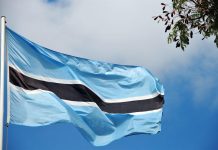Africa-Press – Botswana. The president’s mixed messaging creates policy uncertainty and reflects a posture aimed at managing domestic pressures
Botswana President Duma Boko’s bombshells edging towards resource nationalism over the past few weeks have rattled the mining community, sowing confusion in what has historically been one of Africa’s most stable, predictable and investor friendly mining jurisdictions.
The trend started with Boko’s comments in June, when he said “no minerals will leave the country without being processed”. More recently, he turned his sights on De Beers, in effect blaming the global diamond giant for Botswana’s strained fiscal and balance of payments positions. Taken together, these statements have stirred anxiety over whether the country is drifting towards a more unpredictable and hostile business environment.
For investors the question is whether this is mere political theatre or the start of something more serious. There are a few forces behind the recent utterances. First is the domestic political calculus. Boko came to power after a landmark election in November 2024, when his Umbrella for Democratic Change coalition unseated the long-dominant Botswana Democratic Party. He campaigned on a platform of clean governance, economic reform and social upliftment. But now the hard realities of office have set in, while the global diamond sector is in the doldrums.
This has constrained his administration’s ability to deliver on its electoral promises amid global economic headwinds, mounting public expectations and rising internal factionalism in his own party. Against this backdrop his hardline stance on the mining sector and attack on De Beers serve multiple agendas: deflecting blame for economic underperformance, managing party tensions and appealing to a restive electorate looking for scapegoats.
The second is economic strain. Botswana’s economy contracted by 3% in 2024, largely due to a prolonged slump in diamond exports. Further contraction is forecast for 2025. Public balances have also deteriorated postpandemic, with the fiscal and current account balances expected to yield deficits of 11% of GDP and 7.9% of GDP, respectively, this year, according to the IMF.
The country has also been forced to devalue the pula faster than expected this year from an initial 1.51% to 2.76% as the crawling peg’s mechanisms are undermined by low export performance and reduced foreign exchange accumulation. This has enlarged foreign denominated payments and liabilities.Compounding Botswana’s financial constraints is a forecast decline in Southern African Customs Union revenues across the bloc. With receipts from the regional union accounting for more than 30% of Botswana’s tax revenue, the decline in expected earnings has compounded fiscal pressure. Such shortfalls have forced the government to dip into increasingly limited sovereign reserves. Moreover, the shortfalls are constraining the state’s ability to meet its electoral promises, including new jobs, housing, minimum wage and allowance increases, and green growth.
Botswana’s case is complicated by mixed messages at a sensitive time in its relationship with De Beers and Anglo American. On the one hand the government is reportedly seeking a bigger stake in De Beers, amid its ongoing sale by Anglo American. Yet it is also publicly undermining the company’s credibility. Regardless of intent, the approach risks backfiring given Gaborone’s limited leverage. Botswana remains heavily dependent on De Beers and their joint venture, Debswana, for its economic stability — the company is responsible for more than 80% of the country’s export revenue. Consequently, any sudden shift in policy could further destabilise the diamond sector and by extension, the wider economy.
Arguably the most damaging aspect of the recent controversy is the poor communication strategy. Investor confidence thrives on clarity and consistency, and Botswana’s comparative advantage has always been its predictability. If the government continues down a path of doublespeak, reputational risks will mount. This is particularly the case given that the Boko administration signed a new 10-year sales agreement with De Beers as recently as February. In it, the diamond mining company agreed to a number of concessions demanded by Botswana, including a greater share of diamonds sold domestically, investment into local beneficiation and diversification, and joint efforts at stimulating demand for natural diamonds.
Opinion
RONAK GOPALDAS AND MENZI NDHLOVU: Opportunism meets political theatre in Botswana’s De Beers gambit
The president’s mixed messaging creates policy uncertainty and reflects a posture aimed at managing domestic pressures
31 July 2025 – 05:00
by Ronak Gopaldas and Menzi Ndhlovu
subscribe
Support our award-winning journalism.
The Premium package (digital only) is R30 for the first month and thereafter you pay R129 p/m now ad-free for all subscribers.
Subscribe now
Botswana President Duma Boko’s bombshells edging towards resource nationalism over the past few weeks have rattled the mining community, sowing confusion in what has historically been one of Africa’s most stable, predictable and investor friendly mining jurisdictions.
The trend started with Boko’s comments in June, when he said “no minerals will leave the country without being processed”. More recently, he turned his sights on De Beers, in effect blaming the global diamond giant for Botswana’s strained fiscal and balance of payments positions. Taken together, these statements have stirred anxiety over whether the country is drifting towards a more unpredictable and hostile business environment.
For investors the question is whether this is mere political theatre or the start of something more serious. There are a few forces behind the recent utterances. First is the domestic political calculus. Boko came to power after a landmark election in November 2024, when his Umbrella for Democratic Change coalition unseated the long-dominant Botswana Democratic Party. He campaigned on a platform of clean governance, economic reform and social upliftment. But now the hard realities of office have set in, while the global diamond sector is in the doldrums.
This has constrained his administration’s ability to deliver on its electoral promises amid global economic headwinds, mounting public expectations and rising internal factionalism in his own party. Against this backdrop his hardline stance on the mining sector and attack on De Beers serve multiple agendas: deflecting blame for economic underperformance, managing party tensions and appealing to a restive electorate looking for scapegoats.
The second is economic strain. Botswana’s economy contracted by 3% in 2024, largely due to a prolonged slump in diamond exports. Further contraction is forecast for 2025. Public balances have also deteriorated postpandemic, with the fiscal and current account balances expected to yield deficits of 11% of GDP and 7.9% of GDP, respectively, this year, according to the IMF.
The country has also been forced to devalue the pula faster than expected this year from an initial 1.51% to 2.76% as the crawling peg’s mechanisms are undermined by low export performance and reduced foreign exchange accumulation. This has enlarged foreign denominated payments and liabilities.
Picture: 123RF/MAKSIM SHBEKO
Picture: 123RF/MAKSIM SHBEKO
Compounding Botswana’s financial constraints is a forecast decline in Southern African Customs Union revenues across the bloc. With receipts from the regional union accounting for more than 30% of Botswana’s tax revenue, the decline in expected earnings has compounded fiscal pressure. Such shortfalls have forced the government to dip into increasingly limited sovereign reserves. Moreover, the shortfalls are constraining the state’s ability to meet its electoral promises, including new jobs, housing, minimum wage and allowance increases, and green growth.
Botswana’s case is complicated by mixed messages at a sensitive time in its relationship with De Beers and Anglo American. On the one hand the government is reportedly seeking a bigger stake in De Beers, amid its ongoing sale by Anglo American. Yet it is also publicly undermining the company’s credibility. Regardless of intent, the approach risks backfiring given Gaborone’s limited leverage. Botswana remains heavily dependent on De Beers and their joint venture, Debswana, for its economic stability — the company is responsible for more than 80% of the country’s export revenue. Consequently, any sudden shift in policy could further destabilise the diamond sector and by extension, the wider economy.
Arguably the most damaging aspect of the recent controversy is the poor communication strategy. Investor confidence thrives on clarity and consistency, and Botswana’s comparative advantage has always been its predictability. If the government continues down a path of doublespeak, reputational risks will mount. This is particularly the case given that the Boko administration signed a new 10-year sales agreement with De Beers as recently as February. In it, the diamond mining company agreed to a number of concessions demanded by Botswana, including a greater share of diamonds sold domestically, investment into local beneficiation and diversification, and joint efforts at stimulating demand for natural diamonds.
For many investors, Boko’s remarks appear not only contradictory but destabilising. They call into question the government’s commitment to agreements it has only recently endorsed. The mixed messaging creates uncertainty about Botswana’s policy direction and undermines the goodwill generated by the February deal, which was seen as a constructive reset in the country’s long-standing relationship with De Beers and a foundation for long-term economic stability.
Investor and broader market angst may carry considerable consequences for Botswana’s economy. For one, uncertainty about diamond regulation could prompt economywide risk reassessments, corroding the anchor for the country’s investment grade rating, domestic portfolio investment and foreign direct investment. Institutional investors may begin pricing in increased political risk, resulting in higher borrowing costs and subdued appetite from debt markets. A protracted saga with the country’s most strategic economic partner will also reverberate across the extractive value chain, prompting worry over contractual risk. This could stall mooted investments in mining other minerals, such as manganese, uranium and lithium, hindering Botswana’s diversification and base-broadening efforts.Investor and broader market angst may carry considerable consequences for Botswana’s economy.
To be sure, nationalistic rhetoric in Botswana is part of a broader continental trend. While there is a need to reconfigure the relationship between extractive companies and host governments, and the structure of value chains, African governments are mostly attempting to assert control over extractive sectors as a perceived quick fix to financial constraints and to appease demanding local populations. Governments are also seeing the opportunity to maximise short-term earnings from extractives by leveraging their endowments of critical and rare earth minerals amid the ongoing boom.
However, while nationalist pivots are politically expedient, they are economically imprudent. As demonstrated in places such as Tanzania and Zambia under former presidents Edgar Lungu and John Magufuli, host governments risk spooking the very investors they need to maximise earnings from their mineral endowments. Credible, collaborative and transparent engagement is necessary for greater and more equitable prosperity in what is a symbiotic relationship.
As to how Botswana’s discord with De Beers plays out — it appears that the situation is likely to escalate before de-escalating. After Boko, Botswana finance minister Bogolo Kenewendo told the Financial Times that the country wanted a controlling stake in De Beers before its sale by Anglo American. This, according to Kenewendo, is to ensure “full control over this strategic national asset and the entire value chain, including marketing”. Public antagonism could complicate future negotiations, not only with De Beers and Anglo American but with any prospective investor wary of political risk and state interference. Furthermore, a drawn-out standoff may deter potential private partners essential to the country’s downstream and diversification aspirations. It could undermine the economic sovereignty that Botswana aims to establish.
Boko’s moves probably reflect a strategic posture aimed at managing domestic pressures. But if not managed carefully — and without a credible, face-saving off-ramp — this approach risks morphing into a dangerous gambit with lasting economic consequences.
For More News And Analysis About Botswana Follow Africa-Press






